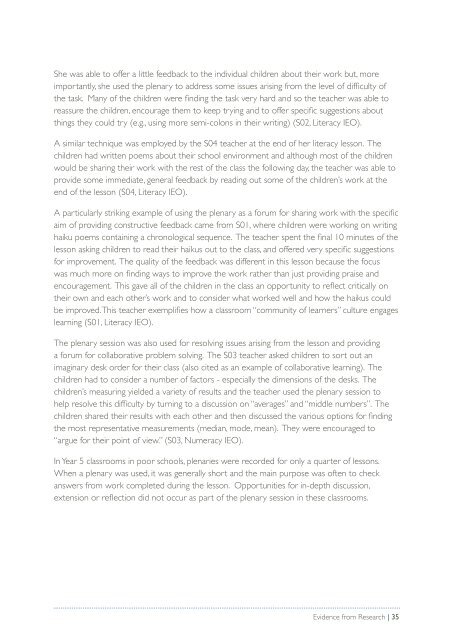Pearson-Exploring-Effective-Pedagogy-in-Primary-Schools
Pearson-Exploring-Effective-Pedagogy-in-Primary-Schools
Pearson-Exploring-Effective-Pedagogy-in-Primary-Schools
You also want an ePaper? Increase the reach of your titles
YUMPU automatically turns print PDFs into web optimized ePapers that Google loves.
She was able to offer a little feedback to the <strong>in</strong>dividual children about their work but, moreimportantly, she used the plenary to address some issues aris<strong>in</strong>g from the level of difficulty ofthe task. Many of the children were f<strong>in</strong>d<strong>in</strong>g the task very hard and so the teacher was able toreassure the children, encourage them to keep try<strong>in</strong>g and to offer specific suggestions aboutth<strong>in</strong>gs they could try (e.g., us<strong>in</strong>g more semi-colons <strong>in</strong> their writ<strong>in</strong>g) (S02, Literacy IEO).A similar technique was employed by the S04 teacher at the end of her literacy lesson. Thechildren had written poems about their school environment and although most of the childrenwould be shar<strong>in</strong>g their work with the rest of the class the follow<strong>in</strong>g day, the teacher was able toprovide some immediate, general feedback by read<strong>in</strong>g out some of the children’s work at theend of the lesson (S04, Literacy IEO).A particularly strik<strong>in</strong>g example of us<strong>in</strong>g the plenary as a forum for shar<strong>in</strong>g work with the specificaim of provid<strong>in</strong>g constructive feedback came from S01, where children were work<strong>in</strong>g on writ<strong>in</strong>ghaiku poems conta<strong>in</strong><strong>in</strong>g a chronological sequence. The teacher spent the f<strong>in</strong>al 10 m<strong>in</strong>utes of thelesson ask<strong>in</strong>g children to read their haikus out to the class, and offered very specific suggestionsfor improvement. The quality of the feedback was different <strong>in</strong> this lesson because the focuswas much more on f<strong>in</strong>d<strong>in</strong>g ways to improve the work rather than just provid<strong>in</strong>g praise andencouragement. This gave all of the children <strong>in</strong> the class an opportunity to reflect critically ontheir own and each other’s work and to consider what worked well and how the haikus couldbe improved. This teacher exemplifies how a classroom “community of learners” culture engageslearn<strong>in</strong>g (S01, Literacy IEO).The plenary session was also used for resolv<strong>in</strong>g issues aris<strong>in</strong>g from the lesson and provid<strong>in</strong>ga forum for collaborative problem solv<strong>in</strong>g. The S03 teacher asked children to sort out animag<strong>in</strong>ary desk order for their class (also cited as an example of collaborative learn<strong>in</strong>g). Thechildren had to consider a number of factors - especially the dimensions of the desks. Thechildren’s measur<strong>in</strong>g yielded a variety of results and the teacher used the plenary session tohelp resolve this difficulty by turn<strong>in</strong>g to a discussion on “averages” and “middle numbers”. Thechildren shared their results with each other and then discussed the various options for f<strong>in</strong>d<strong>in</strong>gthe most representative measurements (median, mode, mean). They were encouraged to“argue for their po<strong>in</strong>t of view.” (S03, Numeracy IEO).In Year 5 classrooms <strong>in</strong> poor schools, plenaries were recorded for only a quarter of lessons.When a plenary was used, it was generally short and the ma<strong>in</strong> purpose was often to checkanswers from work completed dur<strong>in</strong>g the lesson. Opportunities for <strong>in</strong>-depth discussion,extension or reflection did not occur as part of the plenary session <strong>in</strong> these classrooms.Evidence from Research | 35


